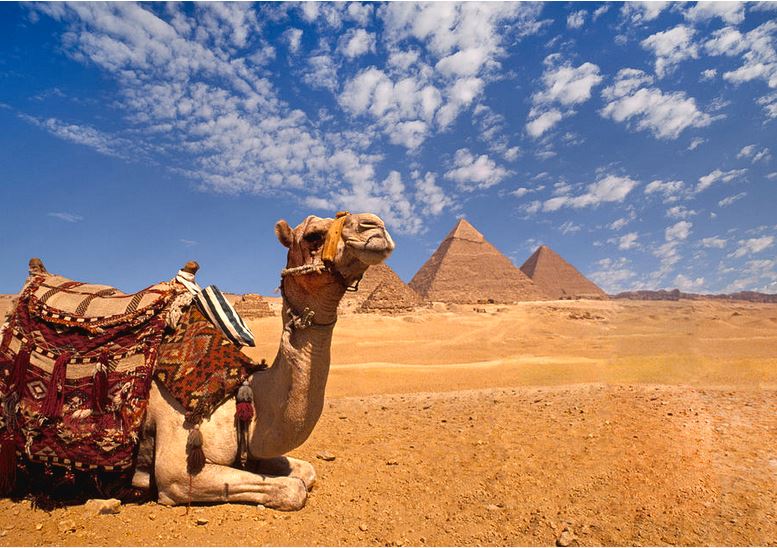Visa
Maltese citizens can apply for an Egyptian E-visa online, which is a convenient option. The e-visa is typically valid for 30 days and can be used for tourism purposes. The application process involves filling out a form, uploading necessary documents (like a passport photo), and paying the visa fee. It usually takes around 7-10 business days to process. You can apply online on the official Egyptian website –
https://www.visa2egypt.gov.eg/
It is important that your passport is valid for at least 6 months from the date of departure, otherwise you will not be allowed to enter the country. For those travellers who do not hold a Maltese passport, it is best to contact the embassy or consulate of that country to check whether you need to apply for a visa or not.
Time Zone
Egypt is in the Eastern European Time (EET) Zone, which is UTC+2. However, Egypt observes daylight saving time (DST), so the time shifts to UTC+3 during the summer months.

Best time to go on Tours in Egypt
The ideal time to go on tours in Egypt is during the cooler months, from October to April, when the weather is pleasantly mild, making sightseeing far more enjoyable. This period is perfect for exploring iconic destinations such as Cairo, Luxor, and the Nile Valley without the intense heat. In contrast, the summer months (May to September) bring scorching temperatures, especially in desert regions and southern Egypt, which can make outdoor activities challenging.
Vaccines
While doing a tour in Egypt should consider getting the following vaccinations:
Hepatitis A and B
Typhoid
Tetanus-Diphtheria
Polio
Measles-Mumps-Rubella (MMR)
Rabies (for those planning extended stays or visits to rural areas)
Malaria prevention (in certain areas)
It’s always advisable to check with a healthcare provider or travel clinic for specific recommendations based on your travel itinerary.
To check about vaccinations please see this link which will give you guidance as to what vaccines need to be taken.
https://wwwnc.cdc.gov/travel/destinations/list
This also depends on the vaccinations already taken in the past. You can contact Floriana Health Centre on 21 243 314 for more information about vaccinations. Please make sure to act on your vaccinations at least 3 months in advance.
Currency
The official currency of Egypt is the Egyptian Pound (EGP). It is recommended to exchange currency at authorized exchange counters, banks, or ATMs available in major cities. Credit cards are widely accepted in larger hotels, restaurants, and shops; however, carrying cash is advisable for small purchases and transactions in rural areas.
Food
Egyptian cuisine is diverse, blending Middle Eastern and Mediterranean flavours. Common foods include:
Koshari: A traditional dish made of rice, lentils, pasta, and topped with fried onions.
Ful Medames: Mashed fava beans, often eaten for breakfast.
Mahshi: Stuffed vegetables like peppers and zucchinis with rice and herbs.
Molokhia: A green leafy vegetable stew served with rice or bread.
Baklava: A sweet pastry made with nuts and syrup.
Street food: Shawarma, falafel, and taameya (Egyptian falafel) are popular snacks.
CLOTHING
Remember to dress appropriately for the climate and cultural norms while on your tours in Egypt. It is important to dress appropriately for both the climate and cultural norms. For hot weather, lightweight, breathable fabrics like cotton and linen are ideal. During the summer months, temperatures can be extremely high, especially in desert areas, so loose-fitting clothing
that covers the skin is recommended to protect from the sun while staying cool. For cultural respect, modest clothing is encouraged, particularly when visiting religious sites. Women should avoid revealing clothing, and both men and women should cover their shoulders and knees when entering mosques or churches. In colder months (October to April), temperatures can drop, especially in the evenings, so bringing a light jacket or sweater is advised. Footwear should be comfortable for walking, especially if you plan to explore archaeological sites or desert areas. When traveling as a tour in Egypt, the right accessories and equipment can enhance your comfort and convenience. Here’s a list of necessities and optional items to consider:
ESSENTIAL ACCESSORIES
Sunglasses and Hat: Protect yourself from the strong sun, especially during the day. A wide-brimmed hat and UV-protective sunglasses are key.
Sunscreen: High SPF sunscreen is essential to avoid sunburn, as Egypt can be very sunny, particularly in desert and southern regions.
Water Bottle: Staying hydrated is important, especially in the heat. Reusable water bottles are eco-friendly and practical
Power Adapter/Converter: Egypt uses the Type C and Type F plugs with a voltage of 220V, so if your devices have a different plug type or voltage, you’ll need an adapter or converter.
Camera or Smartphone: To capture Egypt’s incredible sights, a camera or smartphone is a must, though be mindful of restrictions in certain religious sites about photography.
Travel Insurance: While not an accessory, having travel insurance with coverage for health and trip cancellations is highly recommended for any international trip.
Money Belt or Neck Pouch: To keep your valuables safe, a money belt is useful for carrying cash, cards, and important documents securely.
OPTIONAL EQUIPMENT
Binoculars: If you’re planning on visiting natural areas or bird-watching, binoculars can enhance your experience, especially by the Nile or in the desert.
Portable Charger/Power Bank: For extended days of sightseeing, having a power bank is handy to ensure your devices stay charged.
Scarf or Shawl: Useful for both modesty and comfort, particularly when entering religious sites or during the cooler evenings.
Flashlight or Headlamp: If you’re exploring caves or ancient tombs, a flashlight can be useful, especially when visiting less-lit sites.
Small Backpack or Daypack: Ideal for carrying daily essentials like water, snacks, sunscreen, and your camera while on excursions.
Travel Pillow: For long flights or bus rides, a travel pillow can add comfort.
Mosquito Repellent: Especially in rural areas or near water, mosquito repellent is a goodprecaution against bites, particularly if you’re visiting during the warmer months.
SAFTEY
Egypt is generally safe for tourists, but it’s important to take precautions. Be mindful of pickpockets in crowded areas and only use official taxis or ride-hailing services. Respect local customs by dressing modestly, especially when visiting religious sites, and avoid walking alone at night in unfamiliar areas. Drink bottled water to avoid stomach issues and stay hydrated in the heat, particularly during summer. Stay informed about political situations and avoid demonstrations. Always be cautious with your belongings and beware of scams from individuals offering unsolicited help. By following these guidelines, you can have a safe and enjoyable while doing tours in Egypt.
Country Top things to do by interest
Nature
White Desert (Ras Mohamed National Park): Offers striking desert landscapes and unique rock formations.
Siwa Oasis: A peaceful oasis surrounded by salt lakes, palm groves, and ancient ruins.
Wadi El-Rayan: Known for its beautiful waterfalls and salt lakes.
Beaches, Swimming & Relaxing
Sharm El-Sheikh: Known for its crystal-clear waters, coral reefs, and beautiful beaches on the Red Sea.
Hurghada: A popular beach destination for swimming, snorkeling, and diving.
Dahab: Famous for its laid-back vibe and beautiful beaches, ideal for windsurfing and diving.
Nature & trekking
Mount Sinai: A must for trekking enthusiasts and those seeking a spiritual experience, offering panoramic views.
St. Catherine’s Monastery and the surrounding area: Rich in history and hiking opportunities.
The Black Desert: Offers unique trekking experiences through volcanic mountains and sand dunes.
Wildlife
Ras Mohamed National Park: Home to diverse marine life, including dolphins and colorful coral reefs.
Wadi Natron: Known for its salt lakes and as a habitat for flamingos and other bird species.
Nile River: Boat tours on the Nile offer chances to spot various wildlife, including birds, crocodiles, and other animals.
Sightseeing
Pyramids of Giza: The iconic Great Pyramid, the Sphinx, and other ancient wonders.
Luxor’s Karnak Temple and Valley of the Kings: Two of Egypt’s most important ancient sites.
Abu Simbel: Famous temples built by Ramses II.
Cairo’s Egyptian Museum: Home to artifacts including treasures from King Tutankhamun’s tomb.
Shopping
Khan El Khalili Bazaar (Cairo): A bustling market offering spices, jewelry, textiles, and souvenirs.
Luxor Market: Known for traditional Egyptian goods and local handicrafts.
Sharm El-Sheikh Markets: A mix of high-end stores and local bazaars offering clothing, jewelry, and art.
Adrenaline
Sand-boarding in the White Desert: Experience the thrill of sliding down sand dunes.
Kite surfing in Dahab: Ideal for adrenaline junkies looking to surf on the Red Sea.
Camel racing in the desert: A fun and unique way to experience traditional sport in Egypt.
These are just some of the exciting adventures you can enjoy the tours in Egypt.
Local Living Experiences
Stay with a Nubian family: Experience the life and traditions of Egypt’s Nubian people, famous for their colorful homes and unique culture.
Visit local villages: Explore rural Egypt, where you can see daily life, traditional farming methods, and local crafts.
Culture
Visit Cairo’s Islamic Cairo district: Explore mosques, ancient buildings, and Islamic architecture.
Explore Egyptian museums: Delve into Egypt’s rich history through the Egyptian Museum in Cairo or the newly opened Grand Egyptian Museum.
Attend traditional music and dance performances: Watch folklore performances, especially in cities like Cairo and Luxor.
Children Theme Parks
Dream Park (Cairo): A large amusement park with rides and attractions for children of all ages.
Magic Galaxy (Cairo): A smaller but fun amusement park with rides and entertainment suitable for families.
